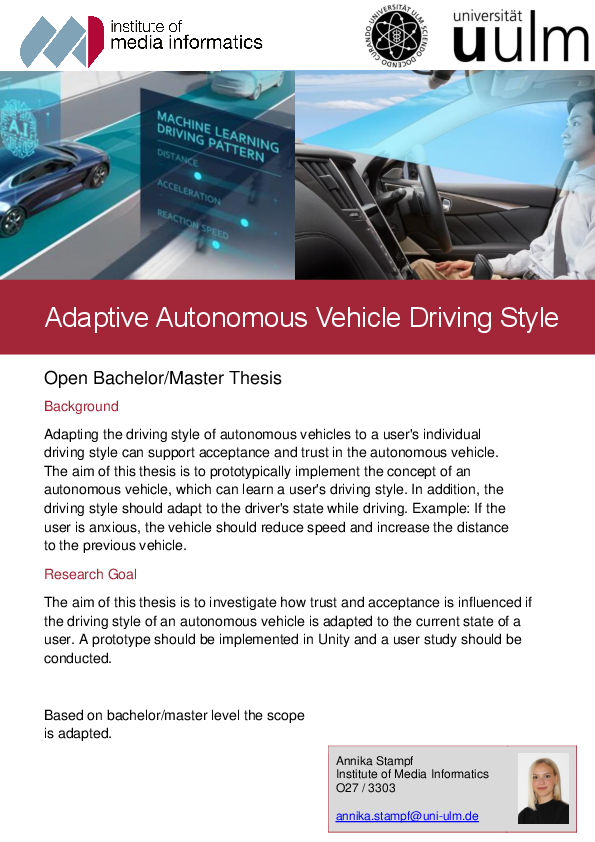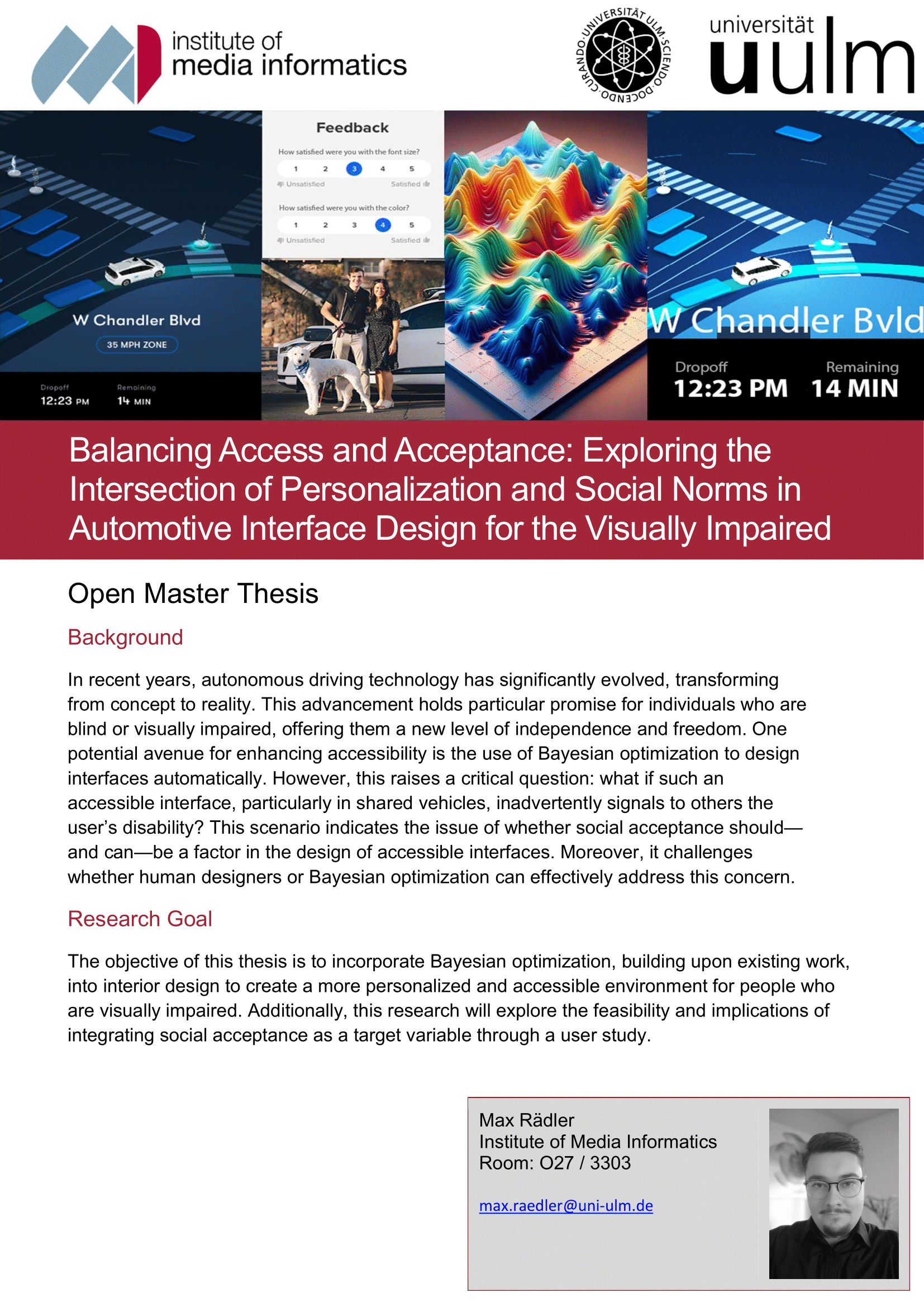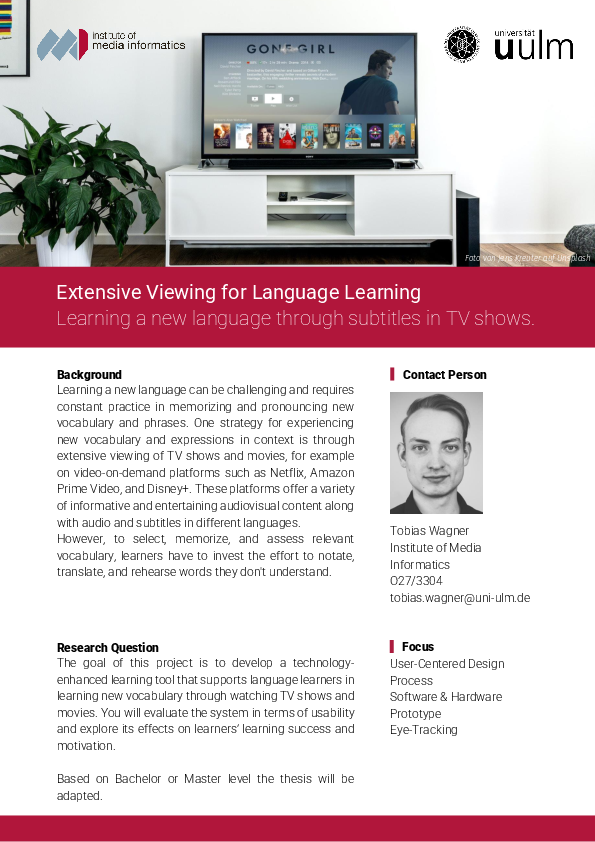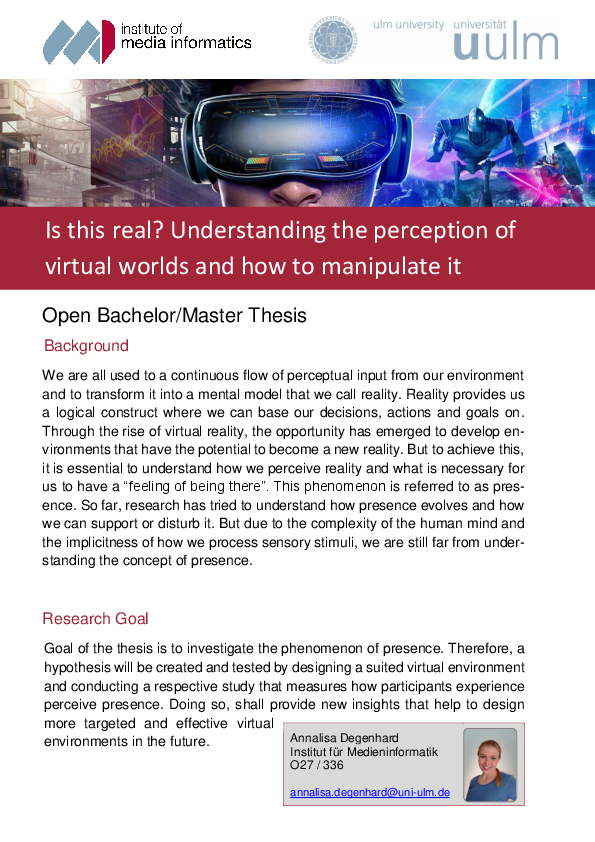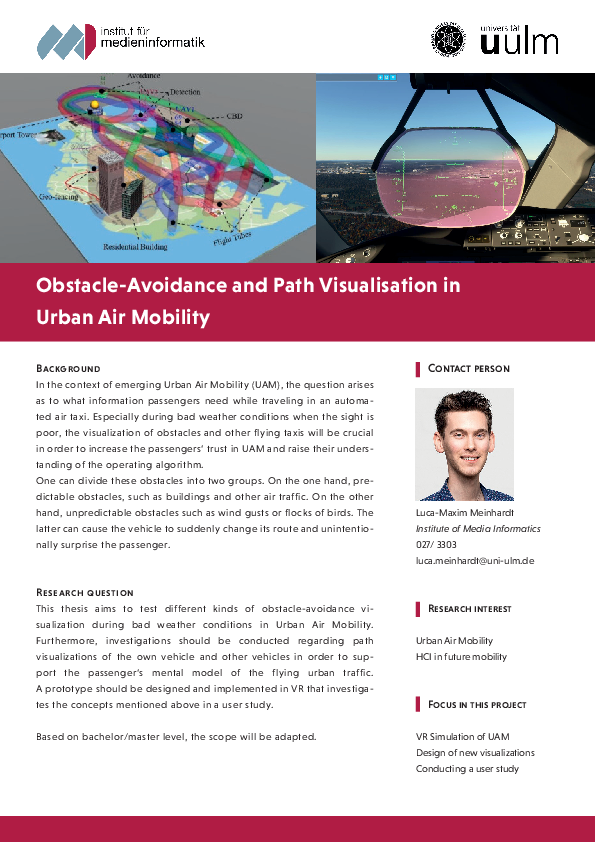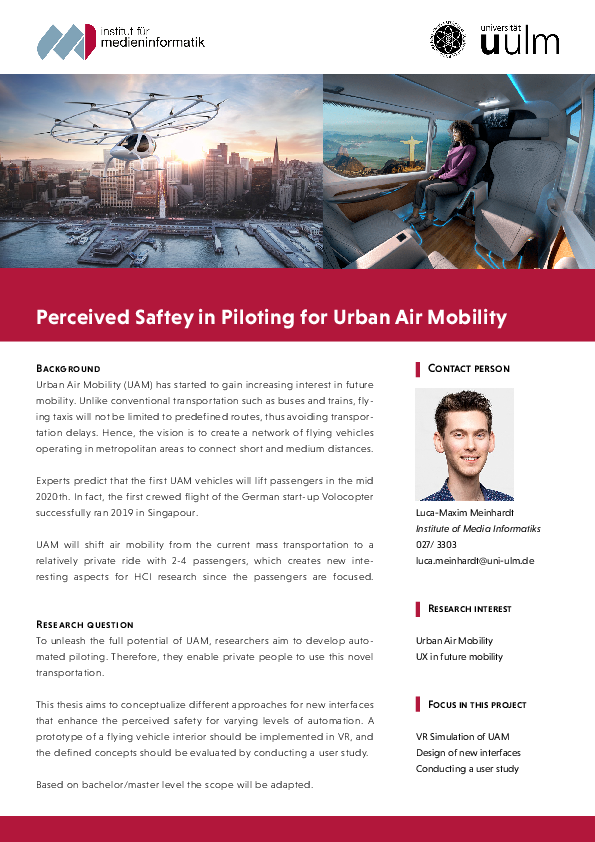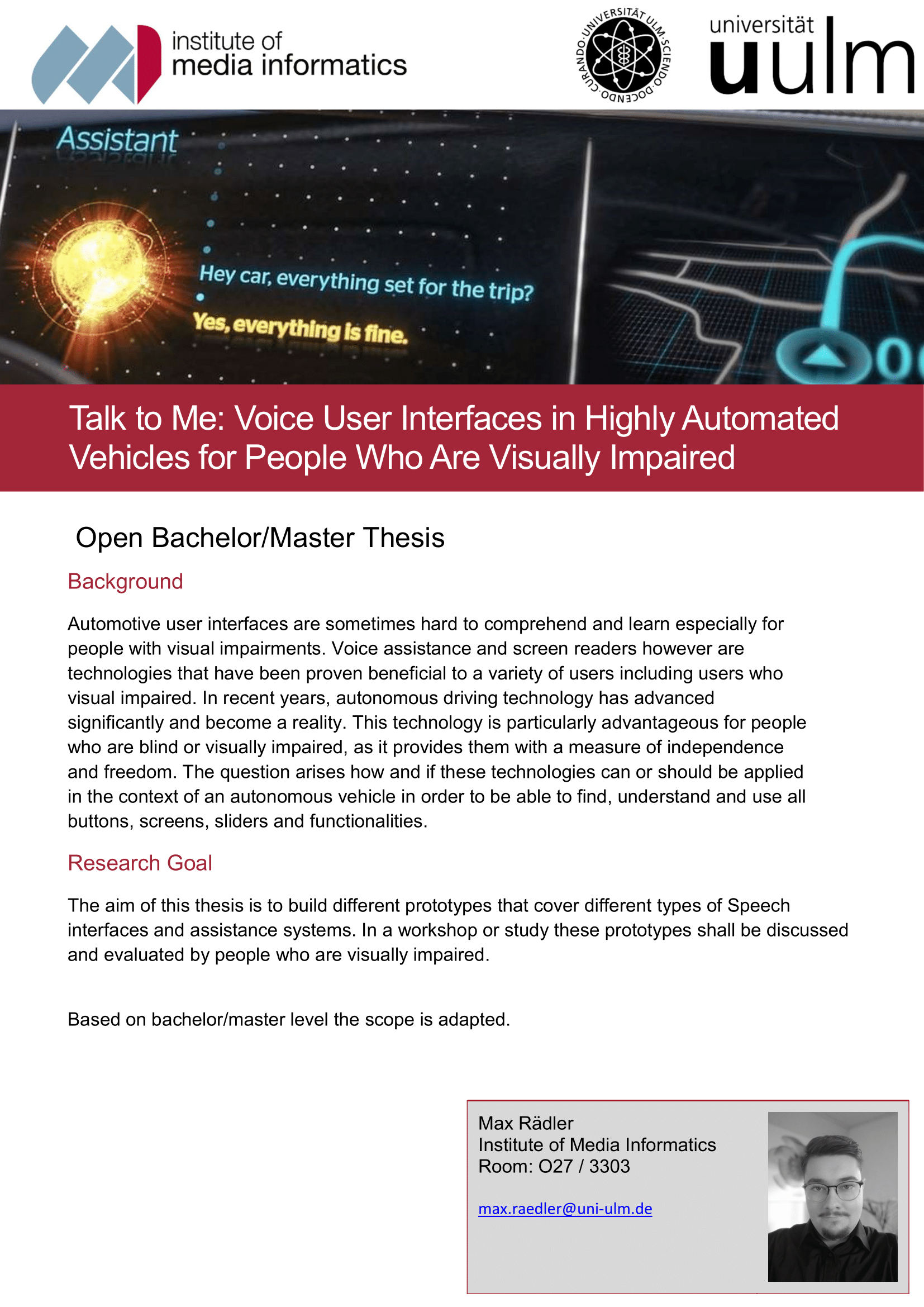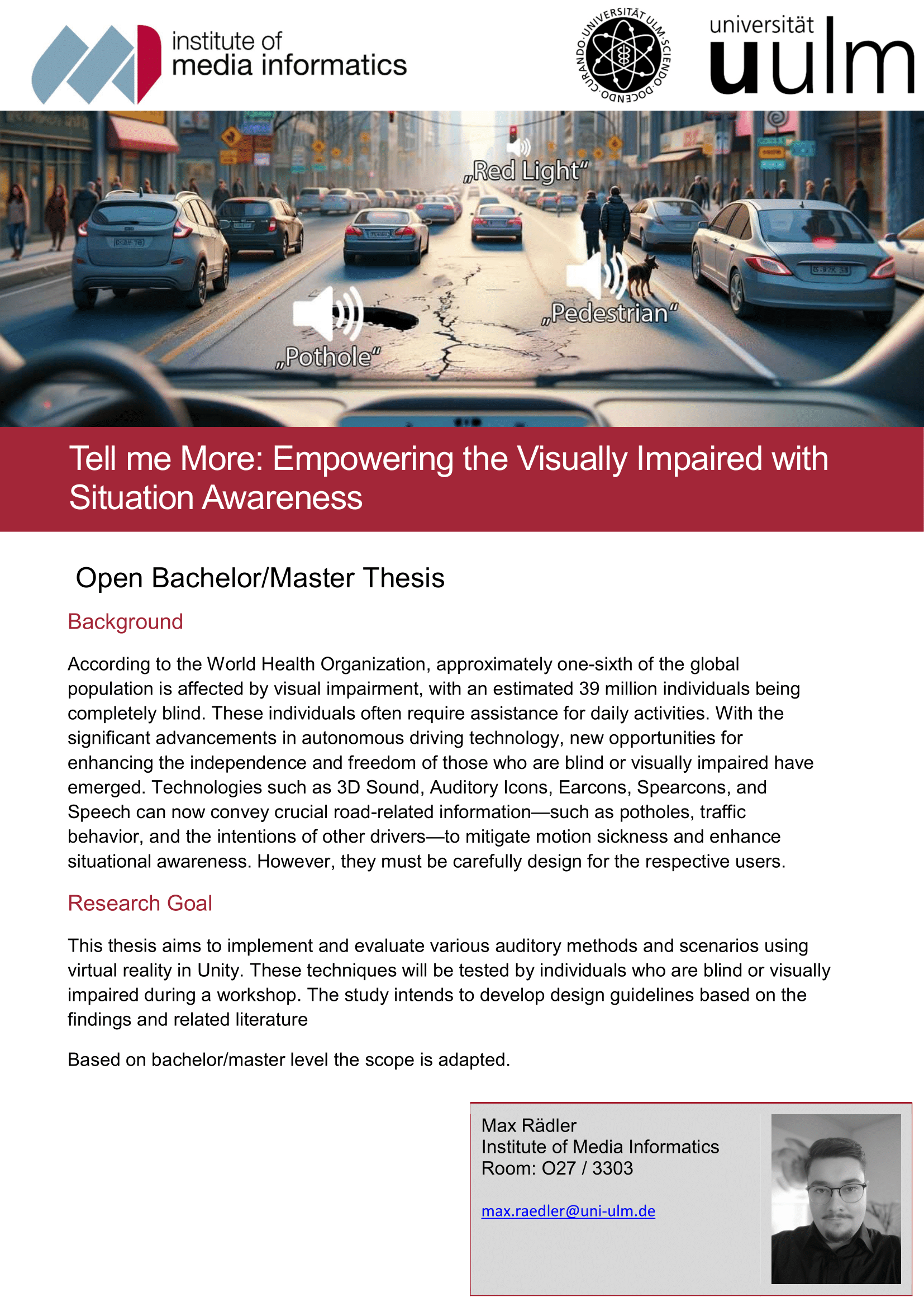For further questions about howto conceptualise and write a thesis, please take a look at the FAQ section.
Bachelor & master theses in the research field of human-computer interaction
We offer thesis topics for bachelor and master level of the study programmes media informatics, computer science, software engineering, and cognitive systems.
Below you can find an uptodate list of topic suggestions. Of cource, we are open to discuss any proposals by students in our research field. The descriptions are partially only visible inside the campus net.
If you are interested, please directly get in touch with a research associate of the research group.
Overview of currently available thesis topics (bachelor level)
Overview of currently available thesis topics (master level)
Details about individual topics
Supervisor: Annika Stampf
Level: Bachelor / Master
Description:
The aim of this thesis is to investigate how trust and acceptance is influenced if the driving style of an autonomous vehicle is adapted to the current state of a user. A prototype should be implemented in Unity and a user study should be conducted.
Supervisor: Annika Stampf
Level: Bachelor / Master
Description:
The aim of this work is to investigate what anthropomorphic features can be used in in-vehicle interfaces (such as physiological signals, e.g. heart beat or a nudge to the driver from the vehicle). These identified features should be implemented prototypically in a VR environment with Unity. Subsequently, a user study should be conducted to evaluate whether those identified features have a positive impact on passengers' trust in HAVs.
Supervisor: Max Rädler
Level: Master
Description:
This thesis explores the use of Bayesian optimization to design accessible interfaces for autonomous vehicles, focusing on the visually impaired. As autonomous driving evolves, offering new levels of independence, the challenge arises in designing interfaces that do not inadvertently disclose the user's disability in shared settings. This research aims to incorporate Bayesian optimization into vehicle interior design, creating personalized environments while considering social acceptance as a crucial factor. The feasibility of these designs will be assessed through a user study, exploring the balance between accessibility and social discretion.
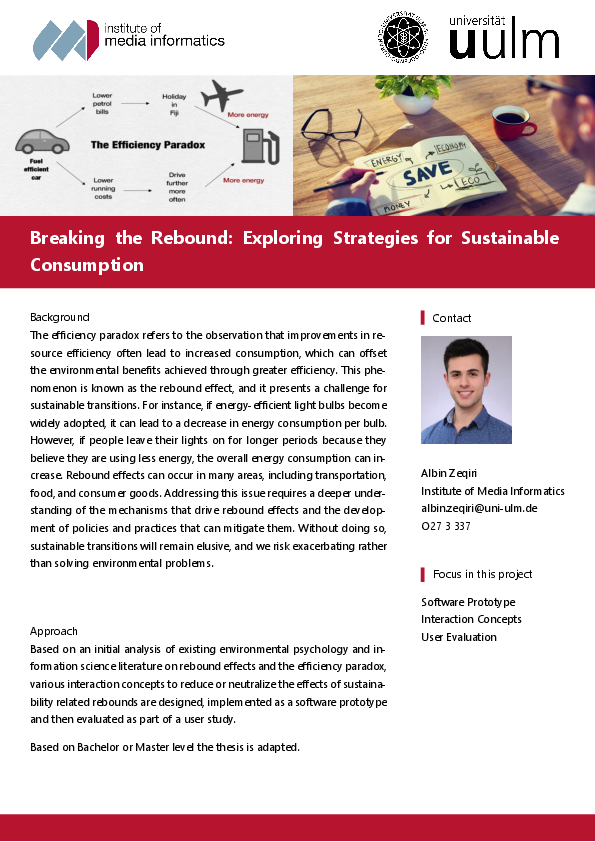
Supervisor: Albin Zeqiri
Level: Bachelor & Master
The efficiency paradox (also known as "rebound effect") is the concept that increases in resource efficiency can lead to higher consumption, which offsets the environmental benefits. For example, energy-efficient light bulbs may lead to decreased energy consumption per bulb, but leaving them on for longer periods could increase overall energy consumption. Without addressing the issue, sustainable transitions will remain challenging, and environmental issues will persist or even worsen. The goal of theses on this topic is to design and evaluate countermeasures to mitigate these effects. Based on Bachelor or Master level the thesis is adapted.
Supervisor: Luca-Maxim Meinhardt
Level: Bachelor & Master
Description
The first thing we do when we get up and the last thing we do before we go to sleep is to look at our phone to check for new notifications and search for new content on social media. Unfortunately, our dependence on technology is already so deeply integrated into our habits that we do not even realize how often we use our phones. On the one hand, this addiction harms us by being less focused due to distraction via notifications. Additionally, it is said that social media contributes to our attention span getting smaller. On the other hand, technology usage is also harming our social interactions during face-to-face interactions. For example, some people focus on their phones instead of engaging in a conversation, decreasing its quality. Recent trends in wearable technology, such as smartwatches and AR glasses, might even deteriorate this behavior. Therefore, new methods and interactions must be found to nudge people towards healthier technology usage and change their habits unconsciously.
Supervisor: Luca-Maxim Meinhardt
Level: Bachelor & Master
Description
The human peripherical vision provides us with information without shifting our focus from the primary task. This is particularly interesting since peripheral vision demands less cognitive load. So information that is positioned at the edge of the field of view can be received unconsciously without drawing attention. A prominent example is car driving since only a short moment of inattention might end in serious accidents. However, even daily struggles with loud and attention-drawing smartphone notifications that distract from working might be solved calmly with peripherical displays. In order to enable this concept, Augmented Reality glasses are the key since they provide us with wearable displays attached to our view.
Supervisor: Max Rädler
Level: Bachelor / Master
Description:
This thesis aims to create a desktop overlay simulation tool for visual impairment, designed to aid developers and designers in understanding the unique needs and experiences of visually impaired individuals. The project will involve developing a prototype simulation that can be applied across various design tasks, followed by a usability study to assess its effectiveness and impact on creating more accessible environments.
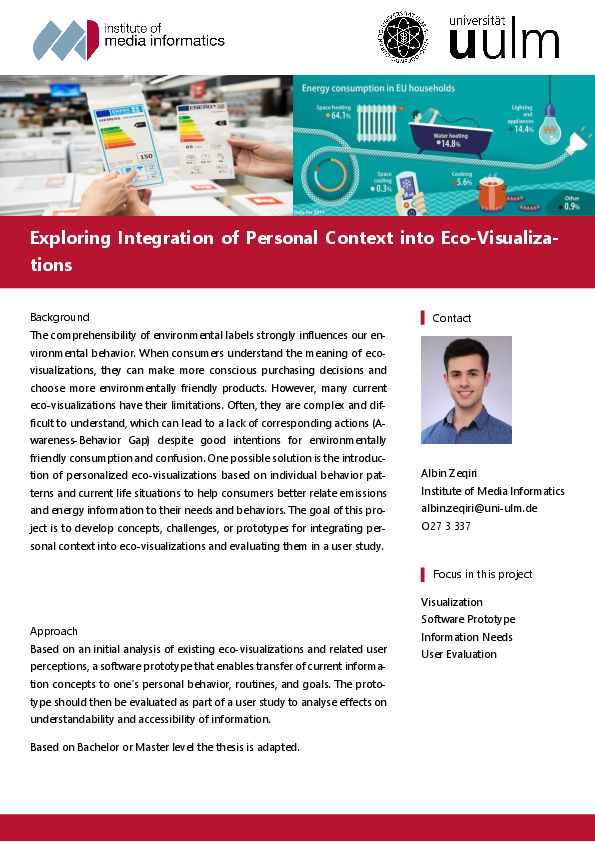
Supervisor: Albin Zeqiri
Level: Bachelor & Master
Environmental labels play a significant role in shaping our behavior towards the environment. Understanding the meaning of eco-visualizations can help consumers make informed and sustainable purchase decisions. However, current eco-visualizations are often complex and difficult to comprehend, leading to a lack of action and confusion among consumers. The Awareness-Behavior Gap describes this issue. Personalized eco-visualizations tailored to individual behavior patterns and lifestyles could be a solution to this problem. This project aims to develop concepts, prototypes, and solutions to integrate personalized context into eco-visualizations and evaluate their effectiveness in user studies.
Betreuer: Tobias Wagner
Level: Bachelor & Master
Beschreibung: The goal of this project is to develop a technology-enhanced learning tool that supports language learners in learning new vocabulary through watching TV shows and movies. You will evaluate the system in terms of usability and explore its effects on learners’ learning success and motivation.
Supervisor: Luca Meinhardt and Jana Funke
Level: Bachelor & Master
Description: Based on literature research and related work, this thesis will aim for a solution to boost our self-control in phone usage. Our goal is to help people establish healthier smartphone usage by nudging them to do sports instead of browsing the phone.
Supervisor: Annika Stampf
Level: Bachelor / Master
Description:
The aim of this work is to design and prototypically implement an in-vehicle avatar, which is able to adapt to the appearance of a passenger, for example by using DeepFake. The avatar should be further able to mimic the passenger. Subsequently, a user study should be conducted to evaluate whether similarity and mimicry have positive impacts on passengers trust in highly automated vehicles.
Betreuer: Annalisa Degenhrad
Level: Bachelor & Master
Beschreibung: Have you ever played a VR game? Whenever you reach the boundary of your real-world play area (which quickly happens in average households), a grid will appear in front of you and will probably ruin your illusion of being in that fantastic VR world. The goal of this project will be to enhance built-in guardian systems for VR. In order to achieve this, you will focus on certain aspects of such systems and conduct a structured analysis to find out how these aspects could be improved to increase user experience. Possible aspects that you may focus on are the sensory representation of collision warnings, collision prevention systems or innovative customization mechanisms to match such systems with various VR worlds. Your goal will be to optimize guardian systems in terms of presence, usability, and safety in order to provide better VR experiences.
Supervisor: Annika Stampf
Level: Bachelor / Master
Description:
The aim of this work is to design new implicit in-vehicle interaction concepts for highly automated vehicles (HAVs). These concepts should be implemented with Unity (in a driving simulator or VR environment). Subsequently, a user study should be conducted to evaluate whether those concepts have a positive influence on passengers’ trust, acceptance, and user experience in HAVs.
Supervisor: Annalisa Degenhard
Level: Bachelor / Master
The aim of this thesis is to explore the phenomenon of presence in virtual reality. A literature analysis should be conducted. By designing a suitable virtual environment a hypothesis on the behavior of presence will be tested in a user study. The goal is to get insights into how users perceive virtual environments and to draw conclusions on how they should be designed to improve the experience of virtual reality.
Supervisor: Luca-Maxim Meinhardt
Level: Bachelor & Master
Description
Imagine the scenario that you need to translate a document in a foreign language that you are not familiar with. You will probably look for an online translator such as Google Translator or DeepL and just copy the translator’s output. But how can you trust this translation? How can you be sure that the translation is precisely what you are trying to say? Prominent examples are sayings that might have no meaning if translated word by word. But since you are not familiar with the language, you cannot verify if the online translator grasped the hidden meaning behind the saying. Current online translators lack this explainability. They provide multiple alternatives for the translated phrase, but there is no explanation about why these alternatives were shown and how well they suit the inputted text.
Obstacle-Avoidance and Path Visualisation in Urban Air Mobility
Supervisor: Luca-Maxim Meinhardt
Level: Bachelor & Master
Description
This thesis aims to test different kinds of obstacle-avoidance visualization during bad weather conditions in Urban Air Mobility. Furthermore, investigations should be conducted regarding path visualizations of the own vehicle and other vehicles in order to support the passenger‘s mental model of the flying urban traffic. A prototype should be designed and implemented in VR that investigates the concepts mentioned above in a user study.
Supervisor: Luca-Maxim Meinhardt
Level: Bachelor & Master
Description: Urban Air Mobility (UAM) has started to gain increasing interest in future mobility. Unlike conventional transportation such as buses and trains, flying taxis will not be limited to predefined routes, thus avoiding transportation delays. Hence, the vision is to create a network of flying vehicles operating in metropolitan areas to connect short and medium distances.
Experts predict that the first UAM vehicles will lift passengers in the mid 2020th. In fact, the first crewed flight of the German start-up Volocopter successfully ran 2019 in Singapour.
UAM will shift air mobility from the current mass transportation to a relatively private ride with 2-4 passengers, which creates new interesting aspects for HCI research since the passengers are focused.
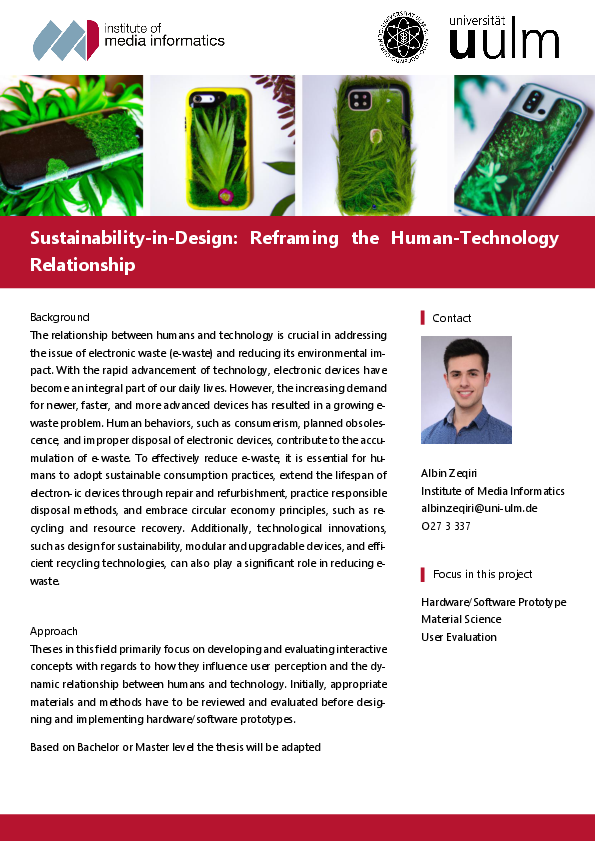
Supervisor: Albin Zeqiri
Level: Bachelor & Master
Goals of theses in this area cover the development of new, interactive concepts that introduce living materials or even microorganisms into hardware and map its respective needs to various device functionalities. Based on bachelor or master level, the scope is adapted.
Supervisor: Max Rädler
Level: Bachelor / Master
Description:
This thesis explores the integration of voice assistance and screen reader technologies in autonomous vehicle interfaces to enhance usability for visually impaired users. With advancements in autonomous driving providing increased independence for the blind and visually impaired, the focus here is on determining how these assistive technologies can be adapted for automotive use. This involves developing various prototypes of speech interfaces and assistance systems. The effectiveness and user-friendliness of these prototypes will be assessed through workshops or studies involving visually impaired participants, aiming to ensure that all vehicle controls are accessible and comprehensible.
Supervisor: Max Rädler
Level: Bachelor / Master
Description:
This thesis focuses on utilizing auditory technologies such as 3D Sound and Earcons in autonomous vehicles to aid visually impaired individuals. With significant advancements in autonomous driving, these technologies can enhance situational awareness by conveying essential road information. This project will implement these auditory methods in Unity's virtual reality environment and evaluate their effectiveness through a workshop with visually impaired participants. The study aims to develop practical design guidelines based on the findings and existing literature.
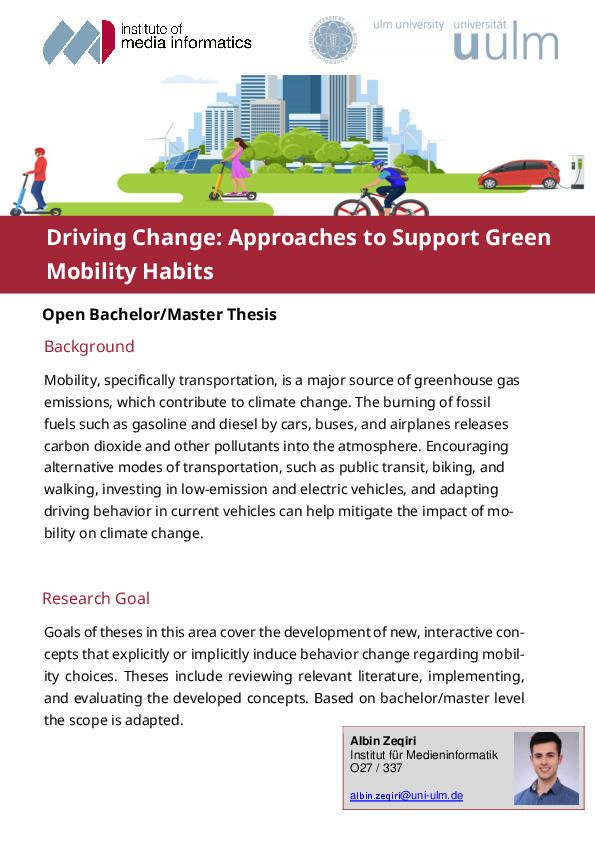
Supervisor: Albin Zeqiri
Level: Bachelor
Goals of theses in this area cover the development of new, interactive concepts that explicitly or implicitly induce behavior change regarding mobility choices. Theses include reviewing relevant literature, implementing, and evaluating the developed concepts. Based on bachelor/master level the scope is adapted.
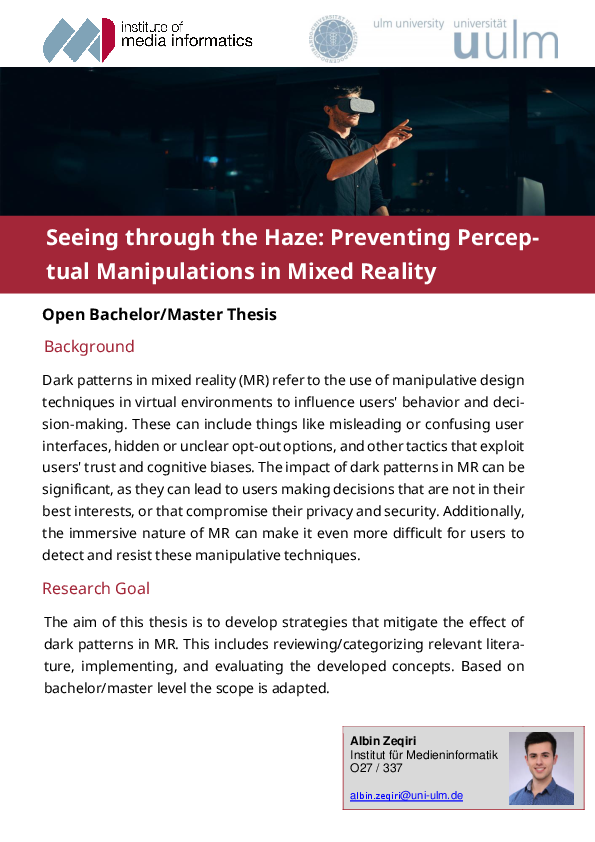
Supervisor: Albin Zeqiri
Level: Bachelor
The aim of this thesis is to develop strategies that mitigate the effect of dark patterns in MR. This includes reviewing/categorizing relevant literature, implementing, and evaluating the developed concepts. Based on bachelor/master level the scope is adapted

